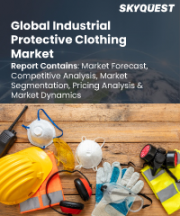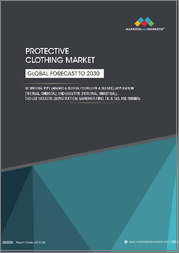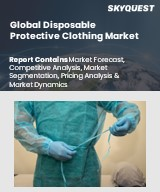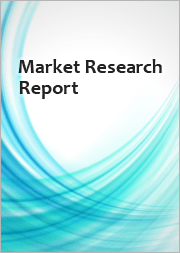
|
시장보고서
상품코드
1899377
산업용 보호복 시장 규모, 점유율, 성장 분석 : 제품 유형별, 제품별, 소재별, 최종 용도별, 지역별 - 업계 예측(2026-2033년)Industrial Protective Clothing Market Size, Share, and Growth Analysis, By Product Type (Disposable Protective Clothing, Reusable Protective Clothing), By Product, By Material, By End-Use, By Region - Industry Forecast 2026-2033 |
||||||
세계의 산업용 보호복 시장 규모는 2024년에 202억 4,000만 달러로 평가되었고, 2025년 216억 3,000만 달러에서 2033년까지 368억 9,000만 달러로 성장할 전망이며, 예측 기간(2026년-2033년) CAGR은 6.9%를 보일 것으로 예측됩니다.
산업용 보호복 세계 시장은 다양한 분야에서 생명을 위협하는 위험으로부터 근로자를 보호해야 하는 중요한 요구에 의해 주도되고 있습니다. 이 의류는 극한의 온도, 유해 화학물질, 물리적 마모 등의 요소에 대한 필수적인 보호 기능을 제공하여 제약, 광업, 석유 및 가스, 인프라 등의 환경에서 직원의 안전을 보장합니다. 작업장 안전 강화에 대한 관심이 높아지면서 안전화, 헬멧, 안면 보호대 등 보호복에 대한 수요가 증가하고 있습니다. 산업안전보건 위험에 대한 인식이 높아지고 산업안전기준에 대한 규제 준수에 대한 인식이 높아짐에 따라, 산업보호복 시장이 크게 성장하고 있습니다.
세계 산업용 보호복 시장을 이끄는 요인
산업재해 증가는 고품질 작업장 건강 솔루션에 대한 수요를 크게 증가시켜 산업용 보호복 시장의 성장을 가속하는 환경을 조성하고 있습니다. 정부 기관의 규제 강화에 직면한 기업들은 작업장의 위험과 사고를 줄이기 위해 안전 대책을 강화할 수밖에 없습니다. 보호 장비의 개선이 필요한 이 상황은 근로자의 안전을 최우선으로 하는 산업용 의류에 대한 투자 증가로 이어져 시장 확대의 중요한 원동력이 되고 있습니다. 그 결과, 소비자 의식 향상과 규제 압력은 다양한 산업에서 첨단 보호복의 필요성을 촉진하고 시장 발전의 전반적인 궤도를 뒷받침하고 있습니다.
세계 산업용 보호복 시장 성장 억제요인
세계 산업용 보호복 시장의 성장은 기술 혁신과 자동화의 발전으로 인해 문제에 직면할 수 있습니다. 이러한 혁신은 공정의 효율성을 높이는 반면, 자동차 산업을 포함한 다양한 분야에서 고용 기회를 감소시킬 수 있습니다. 고용 기회의 감소는 보호복 수요에 부정적인 영향을 미칠 수 있으며, 근로자 수가 감소하면 안전 보호복의 필요성도 감소할 것입니다. 또한, 산업 분야에서는 사람의 개입을 최소화하는 자동화 솔루션으로 전환할 가능성이 있으며, 이는 산업용 보호복 시장을 더욱 제약하는 요인으로 작용할 수 있습니다. 전반적으로, 기술은 이점을 가져다주지만, 고용에 미치는 영향이 보호복 부문의 확장에 장벽이 될 수 있습니다.
세계 산업용 보호복 시장 동향
세계 산업용 보호복 시장은 도시화의 진전과 건강 위험 증가를 배경으로 혁신과 지속가능성으로의 전환이 두드러지게 나타나고 있습니다. 내구성이 뛰어난 고분자 소재를 주성분으로 하는 하이테크 보호복에 대한 수요가 증가하고 있습니다. 그러나 합성 소재의 환경 영향에 대한 소비자의 인식이 높아지면서 친환경 대체 소재의 보급이 촉진되고 있습니다. 동물 및 식물 유래의 지속 가능한 천연섬유의 개발이 진행되어 다양한 보호복 제조에 효과적인 솔루션을 제공함으로써 시장을 변화시키고 있습니다. 그 결과, 환경적, 기술적, 법적, 경제적 이점을 균형 있게 갖춘 천연섬유 기반 복합 보호 장비가 크게 성장하고 있습니다.
자주 묻는 질문
목차
서론
- 조사 목적
- 조사 범위
- 정의
조사 방법
- 정보 조달
- 2차와 1차 데이터 방법
- 시장 규모 예측
- 시장 전제조건과 제한
주요 요약
- 세계 시장 전망
- 공급과 수요 동향 분석
- 부문별 기회 분석
시장 역학과 전망
- 시장 규모
- 시장 역학
- 성장 촉진요인과 기회
- 성장 억제요인과 과제
- Porter의 Five Forces 분석
주요 시장 인사이트
- 중요 성공 요인
- 경쟁 정도
- 주요 투자 기회
- 시장 생태계
- 시장의 매력 지수(2025년)
- PESTEL 분석
- 거시경제 지표
- 밸류체인 분석
- 가격 분석
- 원재료 분석
- 고객과 구매 기준 분석
세계의 산업용 보호복 시장 규모 : 제품 유형별&CAGR(2026-2033)
- 일회용 보호복
- 재이용 가능한 보호복
- 두부 보호구
- 안부 보호구
- 청각 보호구
- 호흡용 보호구
- 족부 보호구
- 수부 보호구
- 전신 방호복
세계의 산업용 보호복 시장 규모 : 제품별&CAGR(2026-2033)
- 내열 및 내화 보호
- 화학 방호
- 클린룸용 의류
- 기계 방호복
- 한정적인 일반 용도
- 기타
세계의 산업용 보호복 시장 규모 : 소재별&CAGR(2026-2033)
- 태국 베크
- 폴리에틸렌
- 폴리프로필렌
- 니트릴
- 부틸
- 네오프렌
- PVC
- 케브라
- 노멕스
세계의 산업용 보호복 시장 규모 : 최종 용도별&CAGR(2026-2033)
- 건설
- 제조업
- 석유 및 가스
- 화학
- 식품
- 의약품
- 헬스케어
- 운송
- 광업
- 기타
세계의 산업용 보호복 시장 규모&CAGR(2026-2033)
- 북미
- 미국
- 캐나다
- 유럽
- 독일
- 스페인
- 프랑스
- 영국
- 이탈리아
- 기타 유럽
- 아시아태평양
- 중국
- 인도
- 일본
- 한국
- 기타 아시아태평양
- 라틴아메리카
- 브라질
- 기타 라틴아메리카
- 중동 및 아프리카
- GCC 국가
- 남아프리카공화국
- 기타 중동 및 아프리카
경쟁 정보
- 주요 5개사 비교
- 주요 기업의 시장 포지셔닝(2025년)
- 주요 시장 기업이 채택한 전략
- 최근 시장 동향
- 기업의 시장 점유율 분석(2025년)
- 주요 기업 개요
- 기업 상세
- 제품 포트폴리오 분석
- 기업 부문별 점유율 분석
- 매출 전년대비 비교(2021-2023년)
주요 기업 개요
- 3M Company(United States)
- DuPont de Nemours, Inc.(United States)
- Ansell Limited(Australia)
- Kimberly-Clark Corporation(United States)
- Honeywell International Inc.(United States)
- Lakeland Industries, Inc.(United States)
- Alpha Pro Tech Ltd.(Canada)
- Sioen Industries NV(Belgium)
- Cintas Corporation(United States)
- Delta Plus Group(France)
- Radians, Inc.(United States)
- National Safety Apparel, Inc.(United States)
- Koninklijke Ten Cate NV(Netherlands)
- Lindstrom Group(Finland)
- Bennett Safetywear Ltd(United Kingdom)
- Mallcom(India) Ltd.(India)
- Oftenrich Holdings Co., Ltd.(Taiwan)
- Superior Uniform Group, Inc.(United States)
- MSA Safety Incorporated(United States)
- UniFirst Corporation(United States)
결론과 제안
LSH 26.01.12Global Industrial Protective Clothing Market size was valued at USD 20.24 Billion in 2024 and is poised to grow from USD 21.63 Billion in 2025 to USD 36.89 Billion by 2033, growing at a CAGR of 6.9% during the forecast period (2026-2033).
The global market for industrial protective clothing is driven by the critical need to safeguard workers from life-threatening hazards in various sectors. These garments offer essential protection against elements such as extreme temperatures, harmful chemicals, and physical wear, ensuring employee safety in environments like pharmaceuticals, mining, oil and gas, and infrastructure. The rising emphasis on enhancing workplace safety has led to heightened demand for protective apparel, including items such as safety boots, helmets, and face shields. As organizations prioritize the reduction of workplace injuries and fatalities, the industrial protective clothing market is experiencing significant growth, fueled by a heightened awareness of occupational health risks and regulatory compliance for worker safety standards.
Top-down and bottom-up approaches were used to estimate and validate the size of the Global Industrial Protective Clothing market and to estimate the size of various other dependent submarkets. The research methodology used to estimate the market size includes the following details: The key players in the market were identified through secondary research, and their market shares in the respective regions were determined through primary and secondary research. This entire procedure includes the study of the annual and financial reports of the top market players and extensive interviews for key insights from industry leaders such as CEOs, VPs, directors, and marketing executives. All percentage shares split, and breakdowns were determined using secondary sources and verified through Primary sources. All possible parameters that affect the markets covered in this research study have been accounted for, viewed in extensive detail, verified through primary research, and analyzed to get the final quantitative and qualitative data.
Global Industrial Protective Clothing Market Segments Analysis
Global Industrial Protective Clothing Market is segmented by product type, product, material, end-use and region. Based on product type, the market is segmented into disposable protective clothing, reusable protective clothing, head protection, eye protection, hearing protection, respiratory protection, foot protection, hand protection and full-body protective clothing. Based on product, the market is segmented into heat & flame protection, chemical defending, clean room clothing, mechanical protective clothing, limited general use and others. Based on material, the market is segmented into Tyvek, Polyethylene, Polypropylene, Nitrile, Butyl, Neoprene, PVC, Kevlar and Nomex. Based on end-use, the market is segmented into construction, manufacturing, oil & gas, chemicals, food, pharmaceuticals, healthcare, transportation, mining and others. Based on region, the market is segmented into North America, Europe, Asia Pacific, Latin America and Middle East & Africa.
Driver of the Global Industrial Protective Clothing Market
The rise in work-related injuries has significantly heightened the demand for high-quality workplace health solutions, thereby fostering an environment conducive to the growth of the industrial protective clothing market. As companies face stricter regulations from government entities, they are compelled to implement enhanced safety measures to mitigate workplace hazards and accidents. This necessity for improved protective gear translates into increased investment in industrial clothing that prioritizes worker safety, providing a crucial impetus for market expansion. Consequently, both consumer awareness and regulatory pressures are driving the need for advanced protective apparel across various industries, supporting the overall trajectory of market development.
Restraints in the Global Industrial Protective Clothing Market
The growth of the global industrial protective clothing market may face challenges due to advancements in technology and automation. As these innovations streamline processes, they can lead to reduced employment opportunities in various sectors, including the automotive industry. This decline in job availability can negatively impact demand for protective clothing, as fewer workers necessitate fewer safety garments. Additionally, industries may shift toward automated solutions that require less human intervention, further constraining the market for industrial protective apparel. Overall, while technology offers benefits, its impact on employment can create obstacles for the protective clothing sector's expansion.
Market Trends of the Global Industrial Protective Clothing Market
The Global Industrial Protective Clothing market is witnessing a notable shift towards innovation and sustainability, driven by urban expansion and rising health risks. There is a heightened demand for high-tech protective apparel, primarily composed of durable, polymer-based materials. However, growing consumer awareness regarding the environmental impacts of synthetic materials is paving the way for eco-friendly alternatives. The development of sustainable, natural fibers derived from animals and plants is transforming the market, as these materials offer a viable solution for producing various protective garments. As a result, natural fiber-based composite protective gear is poised for significant growth, balancing environmental, technological, legal, and economic advantages.
Table of Contents
Introduction
- Objectives of the Study
- Scope of the Report
- Definitions
Research Methodology
- Information Procurement
- Secondary & Primary Data Methods
- Market Size Estimation
- Market Assumptions & Limitations
Executive Summary
- Global Market Outlook
- Supply & Demand Trend Analysis
- Segmental Opportunity Analysis
Market Dynamics & Outlook
- Market Overview
- Market Size
- Market Dynamics
- Drivers & Opportunities
- Restraints & Challenges
- Porters Analysis
- Competitive rivalry
- Threat of substitute
- Bargaining power of buyers
- Threat of new entrants
- Bargaining power of suppliers
Key Market Insights
- Key Success Factors
- Degree of Competition
- Top Investment Pockets
- Market Ecosystem
- Market Attractiveness Index, 2025
- PESTEL Analysis
- Macro-Economic Indicators
- Value Chain Analysis
- Pricing Analysis
- Raw Material Analysis
- Customer & Buying Criteria Analysis
Global Industrial Protective Clothing Market Size by Product Type & CAGR (2026-2033)
- Market Overview
- Disposable Protective Clothing
- Reusable Protective Clothing
- Head Protection
- Eye Protection
- Hearing Protection
- Respiratory Protection
- Foot Protection
- Hand Protection
- Full-Body Protective Clothing
Global Industrial Protective Clothing Market Size by Product & CAGR (2026-2033)
- Market Overview
- Heat & Flame Protection
- Chemical Defending
- Clean Room Clothing
- Mechanical Protective Clothing
- Limited General Use
- Others
Global Industrial Protective Clothing Market Size by Material & CAGR (2026-2033)
- Market Overview
- Tyvek
- Polyethylene
- Polypropylene
- Nitrile
- Butyl
- Neoprene
- PVC
- Kevlar
- Nomex
Global Industrial Protective Clothing Market Size by End-Use & CAGR (2026-2033)
- Market Overview
- Construction
- Manufacturing
- Oil & Gas
- Chemicals
- Food
- Pharmaceuticals
- Healthcare
- Transportation
- Mining
- Others
Global Industrial Protective Clothing Market Size & CAGR (2026-2033)
- North America (Product Type, Product, Material, End-Use)
- US
- Canada
- Europe (Product Type, Product, Material, End-Use)
- Germany
- Spain
- France
- UK
- Italy
- Rest of Europe
- Asia Pacific (Product Type, Product, Material, End-Use)
- China
- India
- Japan
- South Korea
- Rest of Asia-Pacific
- Latin America (Product Type, Product, Material, End-Use)
- Brazil
- Rest of Latin America
- Middle East & Africa (Product Type, Product, Material, End-Use)
- GCC Countries
- South Africa
- Rest of Middle East & Africa
Competitive Intelligence
- Top 5 Player Comparison
- Market Positioning of Key Players, 2025
- Strategies Adopted by Key Market Players
- Recent Developments in the Market
- Company Market Share Analysis, 2025
- Company Profiles of All Key Players
- Company Details
- Product Portfolio Analysis
- Company's Segmental Share Analysis
- Revenue Y-O-Y Comparison (2021-2023)
Key Company Profiles
- 3M Company (United States)
- Company Overview
- Business Segment Overview
- Financial Updates
- Key Developments
- DuPont de Nemours, Inc. (United States)
- Company Overview
- Business Segment Overview
- Financial Updates
- Key Developments
- Ansell Limited (Australia)
- Company Overview
- Business Segment Overview
- Financial Updates
- Key Developments
- Kimberly-Clark Corporation (United States)
- Company Overview
- Business Segment Overview
- Financial Updates
- Key Developments
- Honeywell International Inc. (United States)
- Company Overview
- Business Segment Overview
- Financial Updates
- Key Developments
- Lakeland Industries, Inc. (United States)
- Company Overview
- Business Segment Overview
- Financial Updates
- Key Developments
- Alpha Pro Tech Ltd. (Canada)
- Company Overview
- Business Segment Overview
- Financial Updates
- Key Developments
- Sioen Industries NV (Belgium)
- Company Overview
- Business Segment Overview
- Financial Updates
- Key Developments
- Cintas Corporation (United States)
- Company Overview
- Business Segment Overview
- Financial Updates
- Key Developments
- Delta Plus Group (France)
- Company Overview
- Business Segment Overview
- Financial Updates
- Key Developments
- Radians, Inc. (United States)
- Company Overview
- Business Segment Overview
- Financial Updates
- Key Developments
- National Safety Apparel, Inc. (United States)
- Company Overview
- Business Segment Overview
- Financial Updates
- Key Developments
- Koninklijke Ten Cate NV (Netherlands)
- Company Overview
- Business Segment Overview
- Financial Updates
- Key Developments
- Lindstrom Group (Finland)
- Company Overview
- Business Segment Overview
- Financial Updates
- Key Developments
- Bennett Safetywear Ltd (United Kingdom)
- Company Overview
- Business Segment Overview
- Financial Updates
- Key Developments
- Mallcom (India) Ltd. (India)
- Company Overview
- Business Segment Overview
- Financial Updates
- Key Developments
- Oftenrich Holdings Co., Ltd. (Taiwan)
- Company Overview
- Business Segment Overview
- Financial Updates
- Key Developments
- Superior Uniform Group, Inc. (United States)
- Company Overview
- Business Segment Overview
- Financial Updates
- Key Developments
- MSA Safety Incorporated (United States)
- Company Overview
- Business Segment Overview
- Financial Updates
- Key Developments
- UniFirst Corporation (United States)
- Company Overview
- Business Segment Overview
- Financial Updates
- Key Developments



















